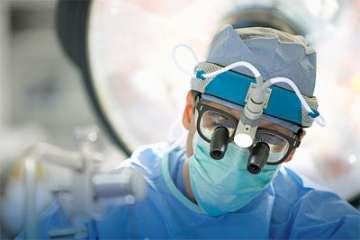Lung Volume Reduction
Find your care
As leaders in COPD care, we deliver effective treatments and support. Call 310-825-8061 to connect with an expert.
What treatments can be done for advanced COPD?
As COPD becomes more advanced, sometimes the lungs develop “air trapping”, where because the lungs become stretched out, they don’t empty old air from breathing as well as they should. This also means that the most diseased parts of the lungs, which don’t exchange air when we breathe, take up more space in the chest, and prevent healthier parts of the lung from working as well. When this happens, people feel more short of breath and have less endurance to do activities and exercise than they did before they developed COPD. This can be quite debilitating, and even medication and oxygen may not alleviate the shortness of breath completely.

Lung Volume Reduction
In some people, the severe emphysema (diseased, stretched out lung) is found only in certain parts of the chest, rather than evenly distributed throughout it. One treatment for this advanced type of lung disease is to either block off or remove the diseased part of the lung to allow more room in the chest for the healthier part of the lung to expand and exchange air. This can be done through special procedures and surgeries, including bronchoscopic lung volume reduction or lung volume reduction surgery.
In bronchoscopic lung volume reduction, our interventional pulmonologists use a small, flexible camera to go into the lung through the mouth and windpipe and place tiny one-way valves into the parts of the lung that are trapping air. This lets air out of these parts but prevents new air from going in and being trapped. Over time, the trapped air works its way out of the lung, making more room in the chest for the healthier parts of the lung to re-expand and breathe. In lung volume reduction surgery, our thoracic surgeons remove the most diseased part of the lung so that air is not trapped in the chest as badly and lung function can improve.
UCLA is an expert center in both of these types of procedures, and runs a multidisciplinary conference of surgeons, radiologists, and lung disease doctors to determine the safest and best approach for patients who may benefit from one of these procedures. To learn more about our lung volume reduction program, schedule an appointment with our COPD clinic.
Lung Transplantation
In some patients with very severe COPD, lung transplant may be the only option to improve quality and/or length of life. The UCLA COPD Program partners closely with the UCLA Lung Transplant Program to help determine who may benefit from lung transplantation and to help manage patients with advanced COPD prior to transplant.
Links:
COPD Foundation
American Thoracic Society Patient Education Materials (PDF)